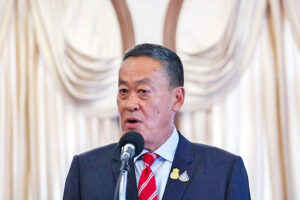BANGKOK (AFP) – Thai Prime Minister Srettha Thavisin could be thrown out of office this week when the country’s Constitutional Court rules on his appointment of a cabinet minister with a criminal conviction.
The case comes a week after the same court disbanded the kingdom’s main opposition political party and banned its former leader, Pita Limjaroenrat, from politics for a decade.
Srettha is accused of violating ethics rules by appointing Pichit Chuenban, a lawyer closely associated with the family of billionaire former prime minister Thaksin Shinawatra, as a minister.
Pichit was sentenced to six months in prison in 2008 for a corruption-related offence.

Pichit resigned from his role in a bid to protect Srettha, but the Constitutional Court still agreed to hear the case, initiated by a complaint from army-appointed senators.
Srettha, whose Pheu Thai leads a multi-party coalition government, has said Pichit underwent thorough vetting.
The PM has suggested the possibility of a cabinet reshuffle if he remains in office, according to local media.
If he is removed from office, Pheu Thai would have to nominate a new candidate for prime minister.
The Constitutional Court has dismissed prime ministers in the past, but analyst Thitinan Pongsudhirak said he does not expect the prime minister to be kicked out.
“I think he will survive because it is hard to find a replacement,” he told AFP.
“He also hasn’t done anything wrong and he is hardworking.”
Srettha, a real estate developer who entered politics last year, has seen his policies face significant opposition since he came into office, with a June poll showing that a majority of Thais reject his agenda.
He has pledged support for marriage equality, which was enacted in June after years of advocacy by the LGBTQ community.
His proposals to recriminalise cannabis and distribute THB10,000 baht to over 40 million Thais have sparked controversy both nationally and within his coalition.
The case comes as critics, including Pita, warn against the use of “a politicised court as a weapon to destroy political parties”.
The European Union, the United States, the United Nations and human rights groups have blasted the court’s decision to disband Pita’s Move Forward Party (MFP), with the EU saying it harmed democratic openness in Thailand.
The remaining members of MFP launched a new movement on Friday, named “The People’s Party”, with the ambition of bringing change in the next national election, scheduled for 2027.
Thailand has suffered bouts of political instability for decades, undergoing a dozen coups since the end of absolute monarchy in 1932.





